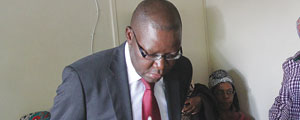
The ordinary person in the street will once again bear the brunt of the cash-strapped government’s desperate search for money following the decision to increase excise duty on petrol and diesel.
NewsDay Editorial
On Monday, Finance minister Tendai Biti announced that excise duty on petrol and diesel had gone up by 25% and 20% respectively, barely four months after another similar increment.
It is grossly unfair to continue suffocating the man on the street to finance national processes while no effort is being put to ensure those using our natural resources are made to be accountable. Already Zimbabwe has a bloated Cabinet, whose ministers are living opulent lifestyles in a country where the bulk of the population is finding it difficult to eke out a living.
Despite Biti arguing the development would not pile inflationary pressure on the economy, previous increases in duty have triggered a rise in the price of fuel.
“One of the measures that we are going to implement with immediate effect is that we are going to raise excise duty on diesel and petrol,” he announced while giving a state of the economy report for February.
“We are going to raise excise duty of diesel to $0,25 from $0,20 and $0,30 from $0,25 for petrol.
“It has been unavoidable that government seeks recourse from the ordinary taxpayer, hence excise duty on diesel and petrol is being reviewed upwards.”
- Chamisa under fire over US$120K donation
- Mavhunga puts DeMbare into Chibuku quarterfinals
- Pension funds bet on Cabora Bassa oilfields
- Councils defy govt fire tender directive
Keep Reading
Latest statistics from the Consumer Council of Zimbabwe’s low income urban earner monthly basket for a family of six show that the cost of living for February increased to $570 from the January figure of $567,90, far above the average monthly salary of $250.
Of concern to the consumer has been the persistent rise in the prices of mealie-meal, cooking oil, bath soap and tea leaves — all attributed to the recent rise in the price of fuel.
The argument by Biti that “our fuel (price) is the lowest in the region” will not be enough to calm the nerves of Zimbabweans who at the current cost of around $1, 55 per litre feel overstretched. The increase coming against the backdrop of below poverty datum line salaries will in fact pile pressure on the already “stressed” consumers.
While government is in desperate need of cash, this should not be at the expense of consumers.
Government has a duty to explore other cash-raising initiatives so as to minimise the burden on ordinary citizens.
Given the opaqueness of operations of most diamond mining companies operating in Marange, the shaky coalition should put its house in order and account for each and every gem that leaves the country’s borders.
Lest we forget, the general feeling among many Zimbabweans is that dollarisation is probably the most important development that came out of the inclusive government.
In everything the government does, we implore it to spare a thought for the overburdened consumers.











